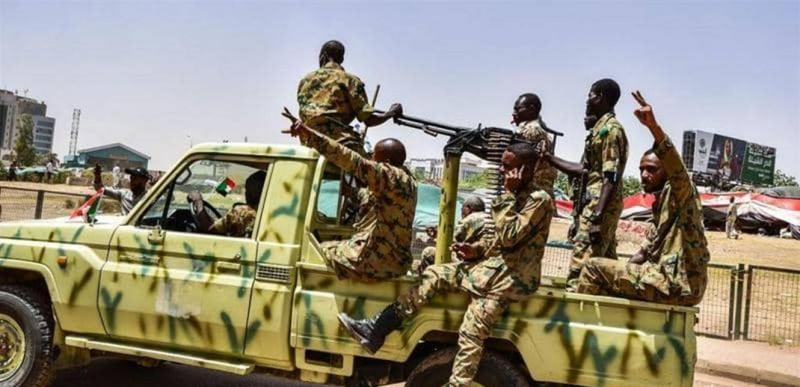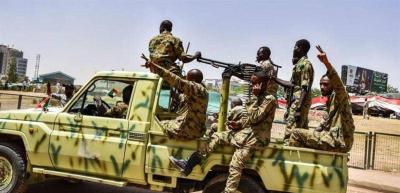Residents of Sudan's capital, Khartoum, reported hearing artillery fire and clashes on Tuesday, despite a unilateral ceasefire declared by the Rapid Support Forces (RSF) in honor of Eid al-Adha. RSF Commander General Mohamed Hamdan Daglo, known as Hemedti, announced a two-day truce on Tuesday and Wednesday in a voice message after his forces took control of a main police station in southern Khartoum, seizing dozens of vehicles and large ammunition stocks. The army has yet to respond to a request for comment.
**UN Statement**
The troika countries—America, Britain, and Norway—called on both the Sudanese army and the RSF to respect human rights, especially since the holidays have not spared Sudanese from enduring the consequences of war since mid-April.
**Prisoners**
The RSF announced on Tuesday the release of 100 prisoners from the Sudanese army in celebration of Eid al-Adha.
**One Million Displaced**
The United Nations High Commissioner for Refugees warned on Tuesday that the number of displaced persons crossing borders due to the conflict in Sudan could exceed previous estimates and rise above one million. So far, the fighting between the warring factions, which began in mid-April, has forced around 600,000 people to flee to neighboring countries including Egypt, Chad, South Sudan, and the Central African Republic. Raouf Mazou, Assistant High Commissioner for Operations, stated, “Unfortunately, given current trends and the situation in Darfur, it is likely that the number will exceed a million,” in response to a question regarding estimates for the next six months.
**Ethnic Motivations**
Mazou referred to attacks and clashes driven by ethnic motives in the Darfur region, which has experienced significant conflict since the early 2000s, resulting in the deaths of around 300,000 people. He did not elaborate on his expectations regarding how much the number of fleeing refugees would exceed one million. The UN estimates over 2.5 million people have been displaced since the war began, most of them within Sudan. Witnesses and activists reported that the latest wave of violence in Darfur has been driven by militias from Arab tribal groups and the RSF, a military faction vying for power with the Sudanese army in the capital Khartoum. Witnesses told Reuters this month that an increasing number of Sudanese citizens fleeing the city of Geneina in Darfur, which has faced repeated attacks, have been killed or shot at while trying to escape on foot into Chad. Mazou noted, “Many women and children are arriving injured. This is a cause for concern.”
He described reaching refugees in Chad as "extremely difficult" due to the rainy season, which has complicated access to refugees and the transport of them from the border to safer camps. He added that the UNHCR has had to revise its expectations for those fleeing Sudan to Chad, raising it to 245,000 from 100,000. He continued, “Fewer people want to stay at the border as the situation in Darfur worsens.”
**Masalit Tribe**
Members of the Sudanese Masalit tribe in Israel are anguished as they watch their relatives and friends fall victim to the bloodshed ensnared by the warring sides in Sudan within the Darfur region, leading to tens of thousands fleeing their homes to neighboring Chad. Local residents hold the RSF and Janjaweed militias responsible for the violence concentrated in the city of Geneina in West Darfur. Ismail Baraka, leader of the Masalit tribe in Israel, told Reuters, “There is no internet there, but we still have contact with people who inform us about what is happening in Geneina now.” He added, “The Janjaweed move from house to house, trying to open windows and doors to kill people. They go from house to house and ask, ‘Are you from the Masalit tribe?’”
More than 5,000 Sudanese live in Israel, mostly in Tel Aviv, with their arrival tracing back to the escalation of violent conflict in Darfur since 2003. The Sudanese government and the Janjaweed were previously accused of committing widespread atrocities to suppress a rebellion from groups complaining of discrimination.




